Пресса
La Polina d’Oksana Volkova est assez séduisante ; son duo avec Lisa (« Уж вечер » c’est le soir) et sa romance « Подруги милые » (mes chères amies) sont exécutés avec élégance, le chant est bien contrôlé, bien projeté…
Певица играет не столько подругу Лизы, сколько её чёрного двойника (это же подчёркивается и её неожиданным мужским нарядом). Ценность этого прочтения не только в драматической силе подачи: Полина у О. Волковой делает из этого романса миниспектакль, то ли предупреждая, то ли провоцируя Лизу.
Avec une voix puissante et dramatique, Oksana Volkova est une Santuzza convaincante. La beauté de son timbre enchante les passages les plus dramatiques (“Io piango”, admirablement tenu), alors que son sens des nuances est contrôlé (« Je suis damnée », chanté fortissimo très timbré puis mezzo-piano d’une voix lisse).
Oksana Volkova incarne une Santuzza à la couleur aussi focalisée que la ligne. Sa retenue souligne admirablement la jalousie qui la torture, sans la livrer à une hystérie vocale qui serait dommageable.
As Maddalena, Oksana Volkova brings vocal allure, making her both a match and contrast for Mastroni’s suave but brusque Sparafucile.
Oksana Volkova’s ripe mezzo makes her Maddalena aurally embody carnality.
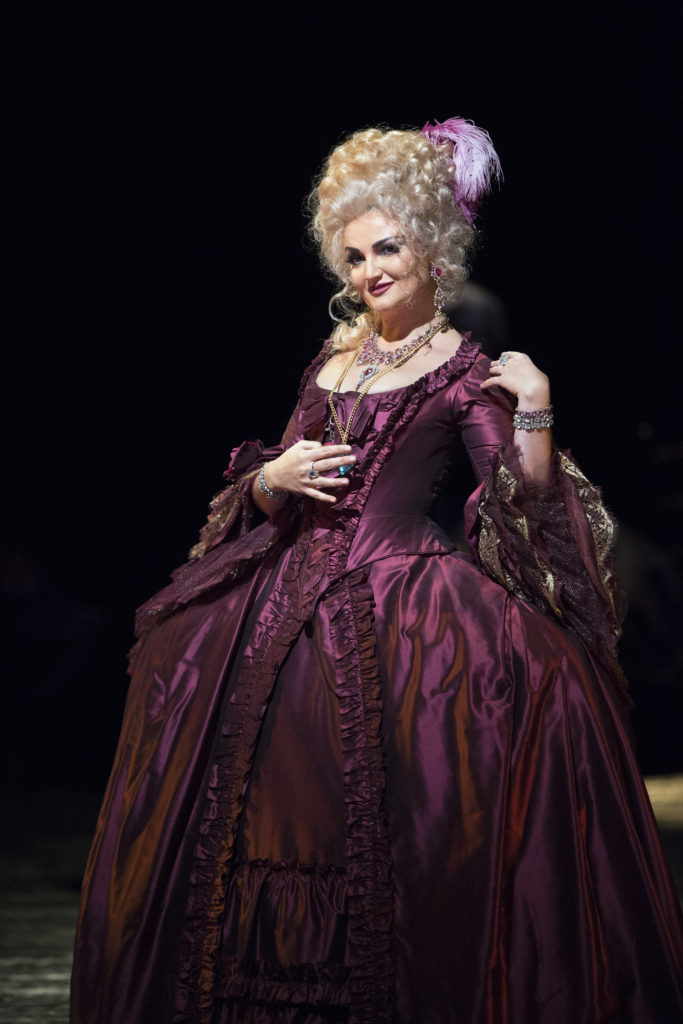
…Hoffmann’s third lover, Giulietta, has little chance to shine outside of the Barcarolle at the top of her act, but Oksana Volkova made the most of the role with her firm, dark soprano.
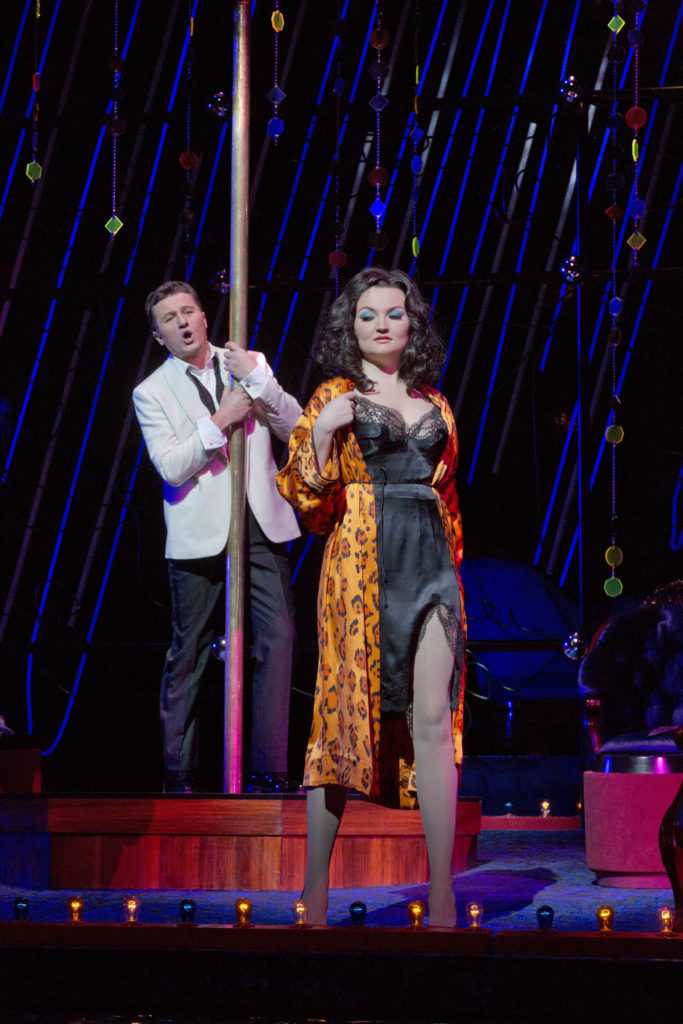
This is followed by the entrance of Sparafucile’s sister, Maddalena, played by Oksana Volkova, who played the role with flirtatiousness, performing a pole dance and singing her role with a delightful richness of tone. She was also highly pleasing in the quartet with the Duke, Gilda and Rigoletto, the aural highlight of the evening.
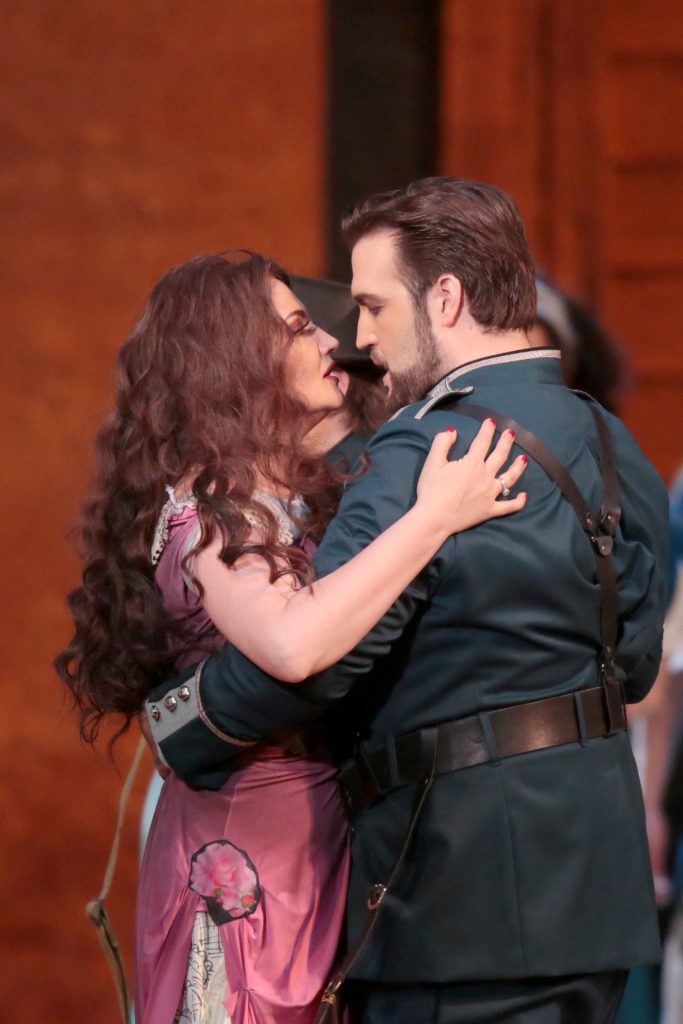
Oksana Volkova’s Carmen at the Aurora Opera House was the best I have seen since Christa Ludwig’s to Domingo’s José in Vienna some 40 years ago. She has it all: an absolute command of the stage, a richly seductive and polychromatic voice, her sinuous and voluptuous physique yet never vulgar mien, the never-changing fiery, free spirit which underlines the role, evident when she emerged from the cigarette factory. It was a superbly unforgettable experience which will be regretted no end by those who missed it. The audience was hers from the start.
Oksana Volkova was a dark voiced, yet lively Olga, clearly very much a party animal.
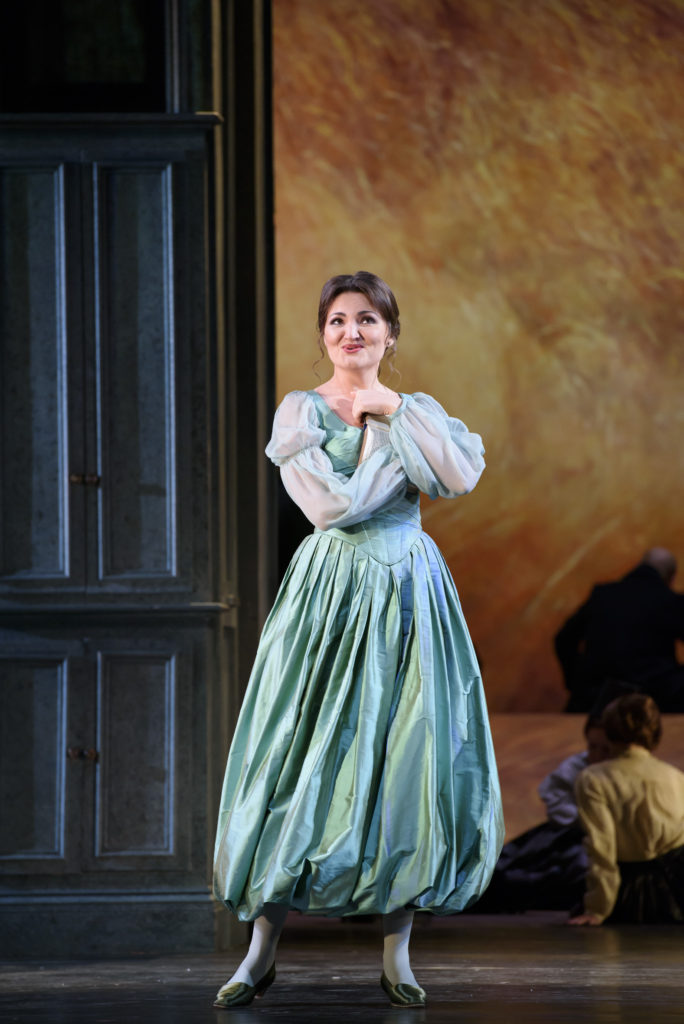
Oksana Volkova also makes her ROH debut as Olga, and her mezzo-soprano proves rich and full.
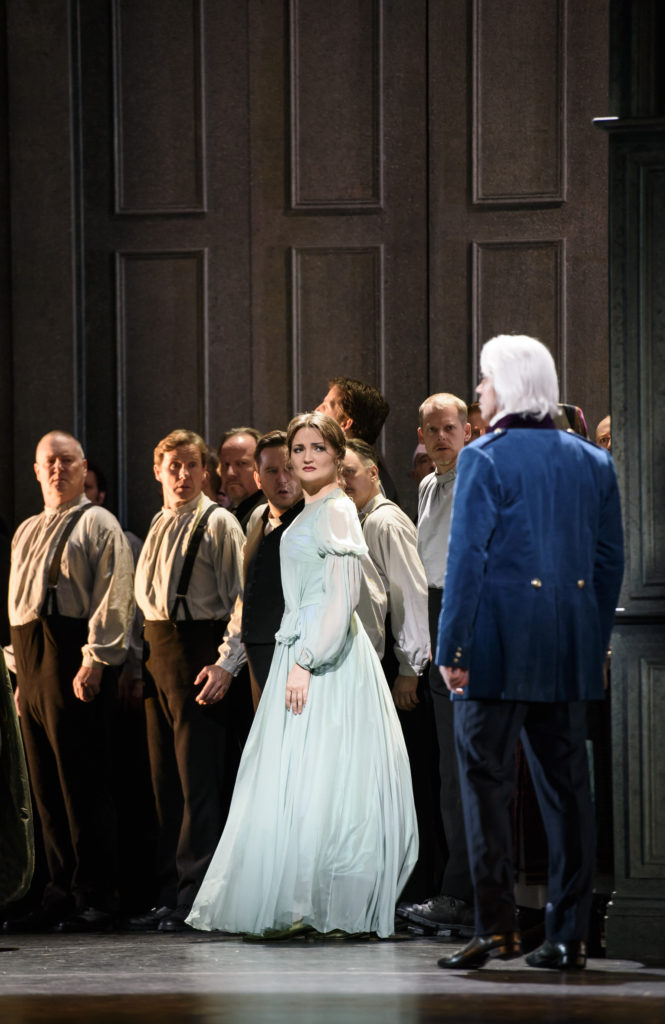
Oksana Volkova’s ripe mezzo gave us a real shot of vodka as Olga, flirting outrageously with Hvorostovsky’s Onegin at the ball to fire Lensky’s jealousy.
The Byelorussian mezzo Oksana Volkova portrayed a seductive – both flirty and hard-to-get – Carmen with a full voice, although it tired during rhe second act (performed without a break from the first, so requiring her to show quite a lot of stamina).
Кармен у Волковой никогда не была поверхностной профурсеткой, благодаря тончайшим вокально-драматическим оттенкам, которыми певица передавала какую-то внутреннюю, никем не востребованную глубину своей героини.
Die junge Russin Oksana Volkova kann nicht nur unendlich lange Beine ins Treffen führen – die Bürosessel-Nummer hat was, mit der sie Don José rumkriegt. Die Vorzüge dieser Mezzosopranistin aus Weißrussland liegen im samtweichen Timbre, nicht in der vokalen Attacke.
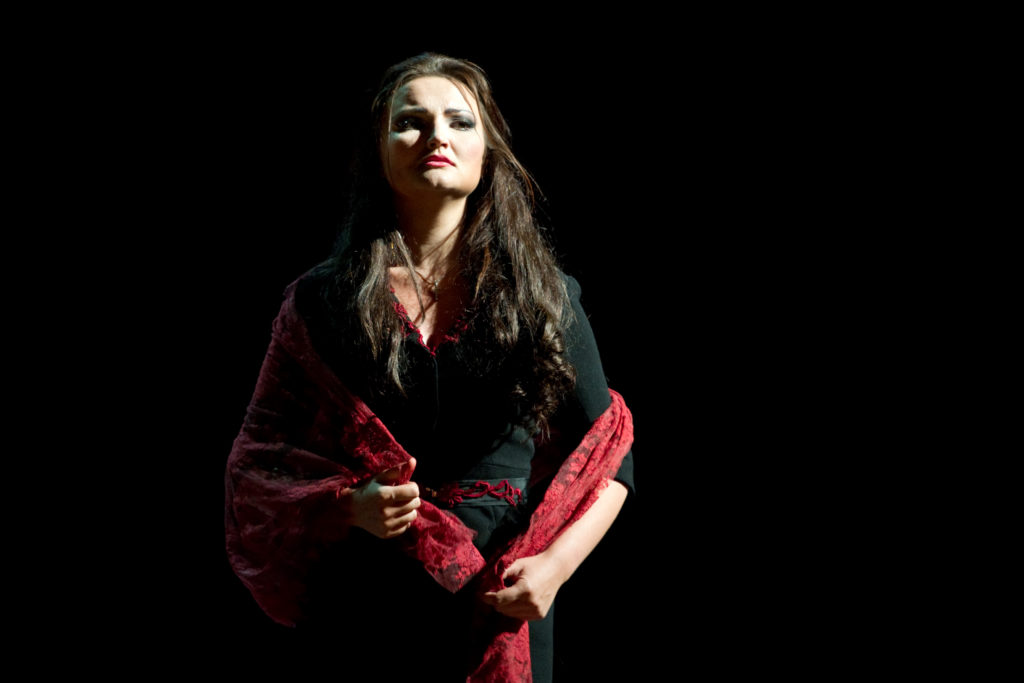
Riesce ad ottenere un successo personale anche Oksana Volkova (Lola), dotata di una voce che sa essere sensuale e pungente allo stesso tempo, con fraseggio chiaro e ricercato che ben esprime la figura di una donna frivola e leggera.
But in a cast where everyone stands out, Very, Mikhail Kolelishvili as the priest, Vladimir Ognovenko, Dimitry Belosselskiy and Oksana Volkova as Sonyetka, a saucy convict who catches Sergei’s ceaselessly roving eye, demand mention.

De Wit-Russische mezzo Oksana Volkova vertolkte Gilda’s verzorgster Giovanna en Maddalena. Het verschil in uitmonstering was zo groot dat ik haar aanvankelijk niet herkende toen ze in de derde akte opkwam. Haar prachtige lage stem kwam in het reeds genoemde kwartet uitstekend tot zijn recht.
Most memorable in supporting roles were Oksana Volkova, who contributed a plummy mezzo-soprano as Olga.
Oksana Volkova proved to be a fine Olga. She radiated with energy from her first entrance and throughout the ball scene. In early scenes she jested with the timid Tatiana and pranced about as Lenski flirted with her. The character’s happy-go-lucky nature matched perfectly with Kwiecien’s relaxed temperament in the early acts and contrasted well with the more introspective Netrebko and Bezcala. The lower range of her voice shone brilliantly at the end of the character’s brief aria.
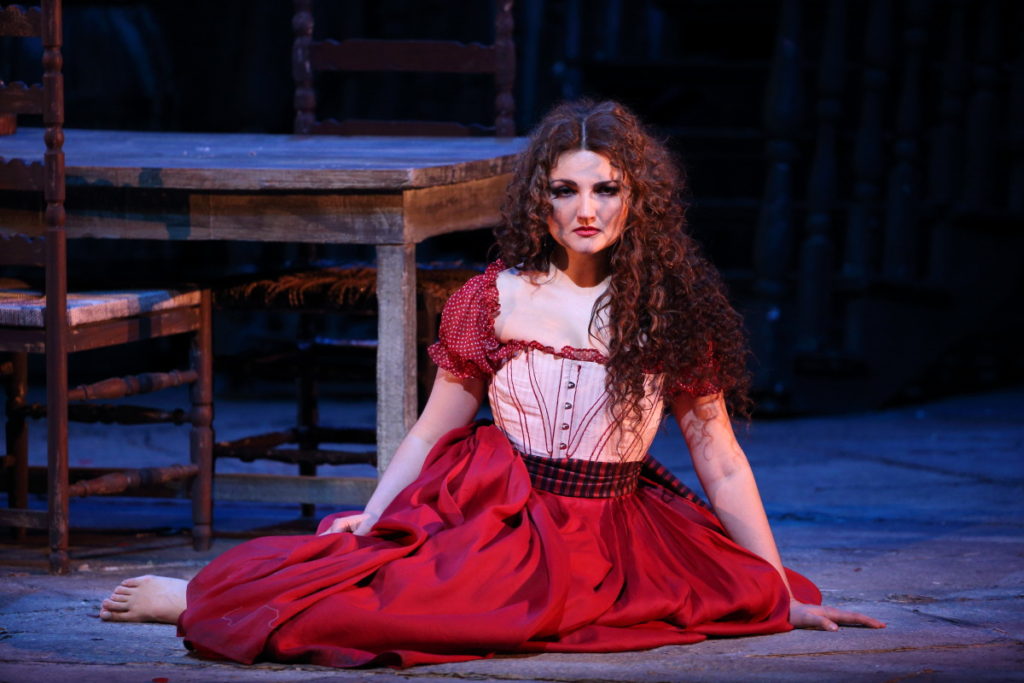
Volkova quien es una especialista en el papel llevó adelante un trabajo digno de destacar, un ejercicio analítico de su voz nos devuelve firmeza en las notas graves y vibrato seguro con un tono sombrío y natural a lo que debemos sumarle una pareja emisión. Volkova sumó a su cantó una acertada actuación que conjugó provocativa seducción, conocimiento del poder que ejerce sobre los demás personajes y seguridad escénica en cada pasaje. “Habanera”, la sencilla y provocativa melodía que Bizet reservó para Carmen es su carta de presentación: describe un carácter fuerte e indomable que Volkova encarnó a la perfección, sus líneas vocales exaltaron a lo largo de toda la ópera los más oscuros y temperamentales sentimientos de la gitana.
Verdi Rigoletto, Metropolitan Opera, New York
Oksana Volkova sings well and vamps and sways predictably as a tiki-lounge-style Maddalena in this show.
Verdi Rigoletto, Metropolitan Opera, New York
…and Oksana Volkova, a supple mezzo, lend strong support as his whorish sister.
Berlioz Damnation de Faust, Nice Opera
Membre de la troupe du célèbre Théâtre Bolchoï de Moscou, la mezzo russe Oksana Volkova est une révélation. Dotée d’une plastique de rêve (elle fait penser immédiatement à sa célèbre consoeur et compatriote Anna Netrebko), elle interprète une Marguerite d’une incomparable intensité, à la fois douce et radieuse; son mezzo de velours donne un sens à chaque mot, mais la voix est aussi d’une belle ampleur, dotée de graves profonds et sa prononciation du français excellente – fait suffisamment rare chez les chanteuses russes pour être souligné. Elle délivre une «Ballade du roi de Thulé» mais surtout le fameux air «D’amour, l’ardente flamme» avec une maîtrise qui suscite l’admiration au regard de son jeune âge et il n’y a guère que le manque de stabilité de son registre medium que l’on pourra lui reprocher. Une belle découvert.
Кармен у Волковой выглядит не столько самодостаточной хулиганкой, какой увидел её режиссёр, сколько женщиной, искушающей судьбу. Все действия, диалоги и провокации Кармен в исполнении Волковой направлены не на Хосе, не на Цунигу, не на Майнулитту и прочих, а на свою собственную судьбу… Эта важная грань интерпретации легко считывается в предельной внутренней концентрации певицы и какой-то интровертивной манере держаться на сцене.



